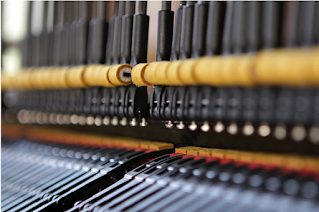
For pianists, a grand piano is a majestic instrument capable of expressing a vast array of emotions. But that expressiveness hinges on one crucial aspect: regulation.
Grand piano regulation is the art of fine-tuning the action, the intricate mechanism that translates your keystrokes into sound. It's like meticulously adjusting the gears of a race car – everything needs to be perfectly aligned for optimal performance.
Why Regulate?
Imagine a piano with sluggish keys or hammers that don't strike the strings evenly. The result? Unresponsive touch, uneven tone, and frustration for the pianist. Regular regulation ensures:
Even key touch: Every key should feel consistent, regardless of its position on the keyboard.
Responsive action: A well-regulated piano allows for effortless playing, enabling pianists to precisely control dynamics and articulation.
Optimal tone: Precise hammer strikes produce a clear, rich sound across the entire range of the instrument.
Long-term piano health: Regulation helps prevent unnecessary wear and tear on the action components, extending the life of your piano.
What Does Regulation Involve?
A piano technician with a keen eye and skilled hands performs regulation. Here's a glimpse into some of the adjustments made:
Key leveling: Ensuring all keys sit at the same height for a smooth playing experience.
Action adjustments: Fine-tuning parts like the let-off mechanism and damper timing for optimal responsiveness.
Hammer voicing: Shaping the felt on the hammers to achieve a desired tonal quality.
It's a Delicate Dance
Regulation is a multi-layered process that requires a deep understanding of piano mechanics and the ability to make minute adjustments. It's not just about following a checklist; a skilled technician uses their experience to tailor the regulation to the specific piano and the pianist's playing style.
Investing in the Magic
While piano regulation might seem like a technical mystery, it's an investment that significantly enhances your piano playing experience. A well-regulated grand piano becomes an extension of yourself, allowing you to express your musicality with freedom and finesse.
Considering having your grand piano regulated? Consult a qualified piano technician to bring out the full potential of your instrument and rediscover the joy of playing.
Get More Info : Grand Piano Regulation
Website : https://www.nypianoworks.com/
Contact Us : Piano Tuner Berkshires






.png)